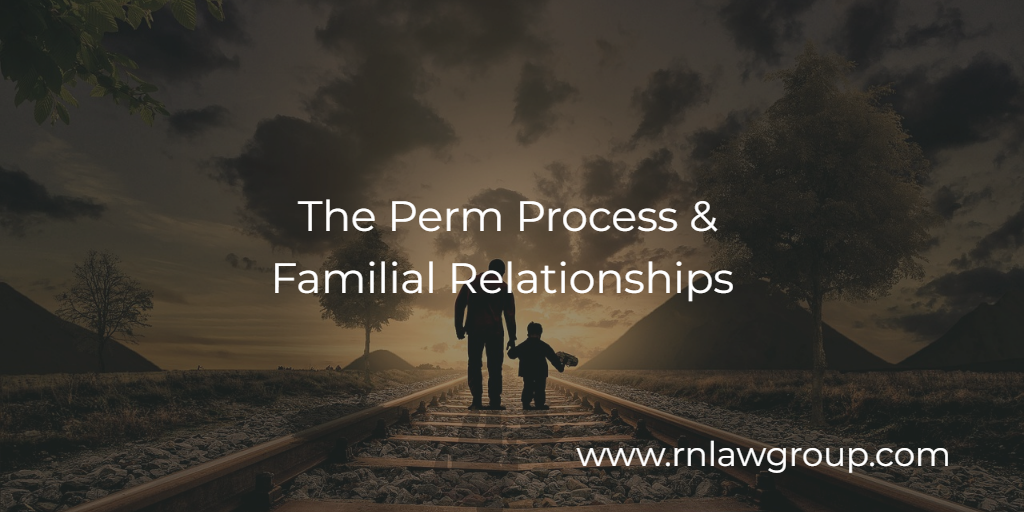
The Perm Process & Familial Relationships
When a person wishes to immigrate to the U.S. based on employment, in most cases one must go through the PERM labor certification process. The PERM process begins with an offered permanent position, and the regulations require the sponsoring employer test the U.S. labor market to determine if there is an “able, willing, qualified, and available ” U.S. worker to fill the position being offered to the beneficiary.
The Department of Labor established the PERM labor certification process to protect U.S. workers. In order to test the U.S. labor market, the sponsoring employer must conduct certain predetermined recruitment steps and evaluate any applicants to determine whether they are “able, willing, qualified, and available” U.S. workers. The PERM process is an attestation-based program and by submitting an application to DOL, the sponsoring employer must attest that the offered position was clearly open to U.S. workers and no “able, willing, qualified, and available” U.S. workers were found after conducting good faith recruitment.
Question C(9) on the ETA-9089 PERM application asks the following: “Is the employer a closely held corporation, partnership, or sole proprietorship in which the alien has an ownership interest, or is there a familial relationship between the owners, stockholders, partners, corporate officers, or incorporators, and the alien?”
Per the FAQ issued by DOL, a familial relationship includes “any relationship established by blood, marriage, or adoption, even if distant.” It continues by including “cousins of all degrees, aunts, uncles, grandparents and grandchildren” and even “relationships established through marriage, such as in-laws and step-families” in the definition.
DOL takes the position that the job opportunity and/or the company’s recruitment efforts could be called into question if the beneficiary has family or themselves hold certain positions within the sponsoring company. There is a presumption the recruitment efforts might not have been conducted in good faith, in a fair and open manner that ensures the offered permanent position is bona fide. In other words, DOL is concerned the sponsoring employer may hold a favorable bias towards the family-member and may be influenced by the relationship to the disadvantage of qualified U.S. workers.
Properly disclosing the familial relationship on Question C(9) of the ETA-9089 form does not guarantee a denial of the PERM application; however, the PERM application will be under higher scrutiny. Typically, DOL will issue an audit to further inquire into the job opportunity to determine whether it is a bona fide job opportunity and good faith recruitment was actually conducted. The sponsoring employer must provide evidence “there has been no undue influence and control and that these job opportunities are available to U.S. workers.” DOL will look into the “totality of the circumstances” to determine whether the job opportunity truly exists or if the sponsoring employer is merely attempting to circumvent the green card process for a family member.
To overcome the presumption a bona fide job opportunity does not exist when a familial relationship is present, it is necessary for the sponsoring employer to clear a high hurdle and have the proper evidence ready. Ultimately, no one factor, even a familial relationship, can be the basis for a PERM denial if the recruitment efforts are clearly satisfied and well documented.
It must be stated, however, not disclosing a familial relationship can have dire consequences. If the truth is ultimately discovered, the PERM application will most certainly be denied or revoked. Other penalties may be issued as well.
Before commencing the PERM process where a familial relationship is involved, it is essential to weigh all factors and discuss the particular situation with a qualified and experienced attorney who will be able to thoroughly and realistically consider all issues present.
By: Jessica Palarca
Jessica Palarca is an attorney in Reddy Neumann Brown’s PERM Labor Certification Department where she assists clients in the beginning stages of the green card process.
Jessica earned her J.D. from the University of Houston Law Center in 2009 and was admitted into the Texas bar the same year. As the child of two immigrant parents, Jessica found her passion for immigration law early in her career. With over a decade of experience in both the private and non-profit sectors, she brings a different perspective to each case she handles. Through the years, Jessica has learned that to achieve the best possible results for each individual served, one must keep things simple and provide personalized attention and care to each case.

